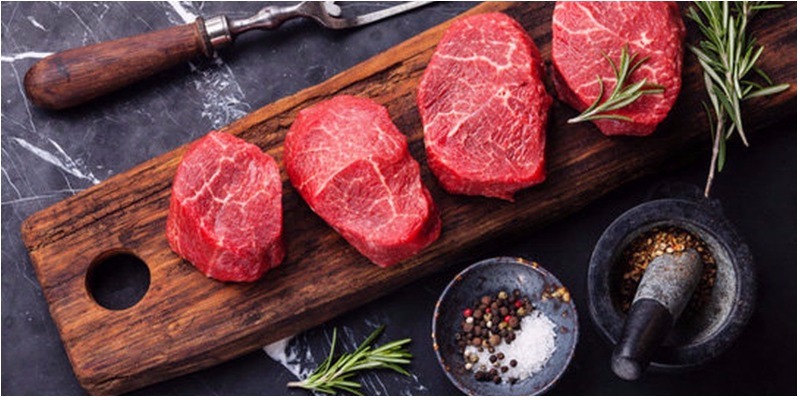Saturated Fat and Cholesterol
According to the United States Department of Agriculture, beef and lamb contain 65 – 130 mg of cholesterol per 3.17 oz serving. These meats also contain a significant amount of saturated fat, ranging from 1 – 10 g per 3.5 oz serving.
Saturated fat and cholesterol from animal sources are not beneficial for your health, which is why the American Heart Association recommends:
+ Keep your daily cholesterol intake, and that of your family, below 300 mg.
+ Limit your saturated fat intake to no more than 7% of your daily calorie consumption.

Increased Cancer Risk
Red meat, when cooked at high temperatures such as grilling or frying, can produce cancer-causing compounds: Heterocyclic Amines, or HCAs, and Polycyclic Aromatic Hydrocarbons, or PAHs.
A cancer epidemiology study from January 2008 indicated that eating red meat cooked at high temperatures increases the risk of prostate cancer.
Additionally, a 2013 study on “Nutrition and Cancer” found that HCAs and PAHs from red meat increase the risk of colorectal cancer.

Processed and Unprocessed Red Meat
The May 2010 issue of Circulation reported that eating red meat eight times a week did not increase the risk of cardiovascular and diabetic diseases compared to those who ate it once a week.
However, processed meat was found to increase the risk of both these diseases.
According to Harvard Health Publications, daily consumption of bacon, ham, and other processed meats increases the risk of heart disease by 42% and the risk of diabetes by 19%.

Recommended Consumption
The American Institute for Cancer Research recommends limiting red meat consumption to less than 18 oz per week, which is about 500 g, and avoiding meat cooked at high temperatures.
If you are on a diet to lower your blood pressure, it is best to consume no more than 1.4 oz of meat per day, or 10.5 oz per week, while maintaining a 2,000-calorie daily intake.

For more information, please refer to: livestrong.com
We hope that with this information, you can make informed choices about red meat consumption and adopt healthier cooking and eating habits.
Cancer-Free’>Tips to Help Ensure Your Refrigerated Food Stays Fresh and Cancer-Free
Unlock Benefits of Meowington’s Meow-tastic Feline Elixir for an Exciting Feverish High
Vietnamese people’s fondness for mangoes is well-known, and they are more than just delicious tropical fruit. Not only do mangoes boast a sweet and sour taste that make them popular for both snacking and cooking, but they also offer a host of health benefits to those who consume them. Originating from Africa, mangoes are now widely grown in both Asia and Latin America.
Unveiling the Miraculous Benefits of Mushrooms
From the savory flavor they offer in dishes to their vast array of health benefits, mushrooms are a major force in the culinary world. Not only are they known as a delicious ingredient in countless recipes, but their impressive benefits can help to fight obesity, high blood pressure, and even cancer prevention.





































